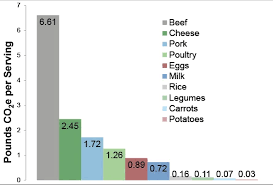 Carbon dioxide equivalents (CO2e) are a measure used to compare and aggregate the greenhouse gas emissions associated with different activities, including food production and consumption.
Carbon dioxide equivalents (CO2e) are a measure used to compare and aggregate the greenhouse gas emissions associated with different activities, including food production and consumption.
The carbon footprint or CO2e of a specific food item can vary depending on several factors, such as the production process, transportation, and waste management.
Plant-based foods: Generally, plant-based foods tend to have lower carbon footprints compared to animal-based foods.
Fruits, vegetables, legumes, grains, and nuts typically have lower CO2e emissions compared to meat and dairy products.
Animal-based foods: Meat and dairy products, particularly beef and lamb, have higher carbon footprints due to factors like methane emissions from livestock, land use for grazing or feed production, and the energy-intensive processes involved in animal agriculture.
Poultry and pork generally have lower CO2e emissions compared to beef and lamb.
Processed and packaged foods: Processed and packaged foods, such as convenience foods, often require more energy and resources in their production, packaging, and transportation, resulting in higher carbon footprints compared to fresh, unprocessed foods.
Food waste: Food waste contributes to greenhouse gas emissions as well.
When food is wasted, the resources used in production, transportation, and storage are wasted as well.
Reducing food waste can help reduce CO2e emissions associated with food production.
The specific emissions associated with different foods can vary significantly depending on various factors, including farming practices, location, and seasonality.
Other greenhouse gases like methane and nitrous oxide, which are produced during agricultural processes, may also contribute to the overall CO2e of food items.
CO2e of plant-based proteins, such as legumes and soy beans represent less than 1 CO2eq per 28 g dry serving whereas on average equivalent amount of animal-based proteins such as ruminant meat are 1200 CO2eq and pork is 200 CO2eq.
Global greenhouse gas submissions from animal-based foods are twice those of plant-based foods and animal-based food production and contributes 57% of food production related greenhouse emissions versus 29% contributed from plant-based foods.
